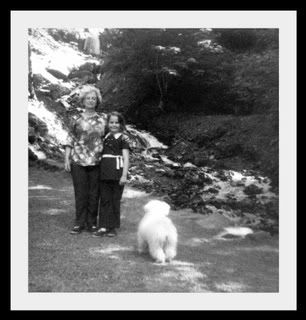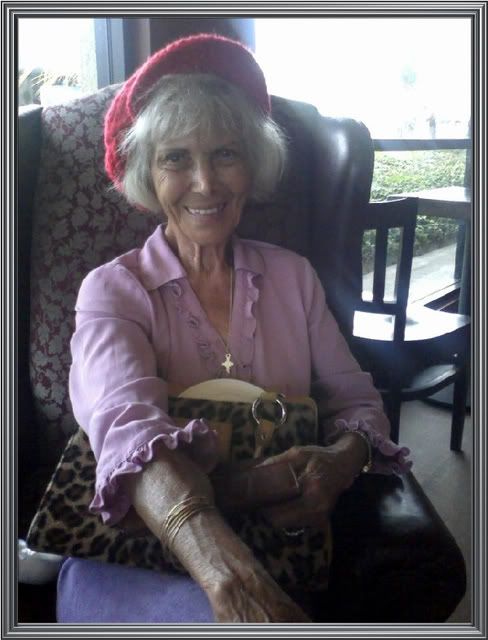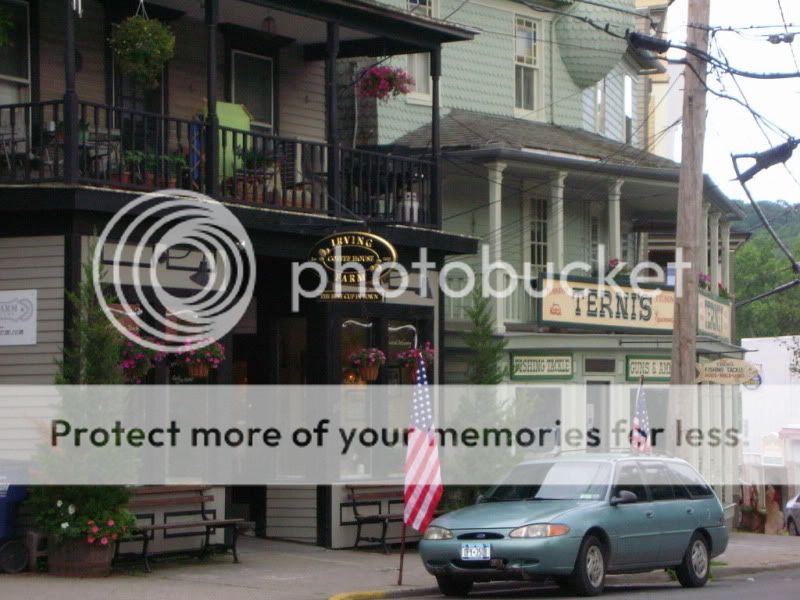The one big nagging problem of memoirs is that many would-be memoirists assume that a memoir is a story where the writer already knows what happens. […] You stifle your memoir in the grave when you consider it a passive account of things past rather than an active, completely new and surprising encounter.
—The Intern
This should be easy, I told myself when I began revising a chapter about Nana. I love her deeply, and I could talk about her all day. But several drafts later, the pages were still lifeless…a bare-bones outline in the graveyard of my imagination.
 I finally realized I needed to step away from the keyboard, to allow myself space and time in which to re-envision the chapter’s essence. And so I did. I sifted through my memories, starting with Nana’s prized button collection—stashed like a pirate’s treasure in a battered biscuit tin, and still sweetly fragranced with her rose-scented lotion. I lingered over my tiny collection of photographs, including this one, where she’s posing with my youngest sister. I searched for new meanings in her favorite expressions. “If wishes were horses, then beggars would ride,” she once told me in a no-nonsense voice, blowing wishes from a dandelion puff with her very next breath. And I remembered her wrinkled hands, plunged deep into an enamel sink full of dishwater. “His Eye is On the Sparrow,” she sang, as her eyes traveled a million miles beyond the kitchen window. And I knew in that moment, as I’ve always known, that my grandmother was watching over me.
I finally realized I needed to step away from the keyboard, to allow myself space and time in which to re-envision the chapter’s essence. And so I did. I sifted through my memories, starting with Nana’s prized button collection—stashed like a pirate’s treasure in a battered biscuit tin, and still sweetly fragranced with her rose-scented lotion. I lingered over my tiny collection of photographs, including this one, where she’s posing with my youngest sister. I searched for new meanings in her favorite expressions. “If wishes were horses, then beggars would ride,” she once told me in a no-nonsense voice, blowing wishes from a dandelion puff with her very next breath. And I remembered her wrinkled hands, plunged deep into an enamel sink full of dishwater. “His Eye is On the Sparrow,” she sang, as her eyes traveled a million miles beyond the kitchen window. And I knew in that moment, as I’ve always known, that my grandmother was watching over me.
Wonderful memories, all of them, but I still couldn’t find my way in—until, that is, I awaked early one morning, on the cusp of a beautiful dream. And in that gauzy space between sleep and wakefulness, I heard the echo of a long-forgotten song.
When I was just a little girl,
I asked my mother, what will I be?
Will I be pretty, will I be rich?
Here’s what she said to me.
Que sera, sera…
It was one of Nana’s favorites. Phrase by phrase, verse by verse, I recalled the lyrics Nana helped me memorize ages ago. What was she telling me, I wondered. Dawn gave way to daylight, and as the clock ticked forward, I sat with my teacher—the teacher—and learned the lessons anew. And then I opened my document and started writing.
This story has another happy—no, magical—ending. Would you like to hear that version, too?
I’m on my way to a Yoga Inversions workshop in Newport Beach, and I stop at my neighborhood cofee shop to get my fix something for the road. I place my order, and as I step away from the counter, a tiny old woman beckons me to her table by the window. “Come here,” she says in a lilting voice, and I obey without thinking, so mesmerized am I by her bright smile and twinkling brown eyes.
 She adjusts her knitted red cap—an odd accessory for this blazing hot day—and clears her throat. And when she starts singing, a shiver runs up my spine.
She adjusts her knitted red cap—an odd accessory for this blazing hot day—and clears her throat. And when she starts singing, a shiver runs up my spine.
Que sera, sera,
Whatever will be, will be.
The future’s not ours to see,
Que sera sera.
“Sing it with me,” she says, and she slips her wrinkled hand into mine. Eyes brimming, chin quivering, I squat at her feet and we sing every line and every verse. Perhaps sensing the sacredness of that moment, the barista places my drink on a nearby table and tiptoes away.
“What’s your name?” the woman asks, and when I say it, she rolls it around her tongue before telling me hers. “It’s a Persian name,” she says, and she gives me her American name, too.
“Do you want to hear a joke?” she asks, and before I have a chance to respond, she launches into a ribald limerick, and on the tail of that, a children’s rhyme. “One two, buckle my shoe…” The world falls away, and I’m living my past. And yes, oh yes, I’m reciting it with her. Her smile is mischievous, her laughter contagious. And when I look into this stranger’s eyes, I see glimpses of my Nana.
But then…I remember there’s somewhere I need to be. “I have to go now,” I say, in a voice choked by regret. I want to capture this moment, keep it forever. So ask if I can take her picture, and she says yes, smiling serenely while I figure out the camera settings on my cell phone. And when I reach for my keys, she grabs my arm and says she wants to teach me something else. “Khuda Hafiz,” she says, “May God be your guardian.” Khuda Hafiz. I repeat it back to her, and my heart is three sizes larger when we hug good-bye.
Serendipity, synchronicity, mystery or miracle? Or angels unawares, perhaps? I don’t know why these “surprising encounters” happen so often to me, nor can I adequately express the depth of my gratitude.


 I finally realized I needed to step away from the keyboard, to allow myself space and time in which to re-envision the chapter’s essence. And so I did. I sifted through my memories, starting with Nana’s prized button collection—stashed like a pirate’s treasure in a battered biscuit tin, and still sweetly fragranced with her rose-scented lotion. I lingered over my tiny collection of photographs, including this one, where she’s posing with my youngest sister. I searched for new meanings in her favorite expressions. “If wishes were horses, then beggars would ride,” she once told me in a no-nonsense voice, blowing wishes from a dandelion puff with her very next breath. And I remembered her wrinkled hands, plunged deep into an enamel sink full of dishwater. “His Eye is On the Sparrow,” she sang, as her eyes traveled a million miles beyond the kitchen window. And I knew in that moment, as I’ve always known, that my grandmother was watching over me.
I finally realized I needed to step away from the keyboard, to allow myself space and time in which to re-envision the chapter’s essence. And so I did. I sifted through my memories, starting with Nana’s prized button collection—stashed like a pirate’s treasure in a battered biscuit tin, and still sweetly fragranced with her rose-scented lotion. I lingered over my tiny collection of photographs, including this one, where she’s posing with my youngest sister. I searched for new meanings in her favorite expressions. “If wishes were horses, then beggars would ride,” she once told me in a no-nonsense voice, blowing wishes from a dandelion puff with her very next breath. And I remembered her wrinkled hands, plunged deep into an enamel sink full of dishwater. “His Eye is On the Sparrow,” she sang, as her eyes traveled a million miles beyond the kitchen window. And I knew in that moment, as I’ve always known, that my grandmother was watching over me. She adjusts her knitted red cap—an odd accessory for this blazing hot day—and clears her throat. And when she starts singing, a shiver runs up my spine.
She adjusts her knitted red cap—an odd accessory for this blazing hot day—and clears her throat. And when she starts singing, a shiver runs up my spine.